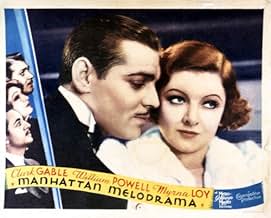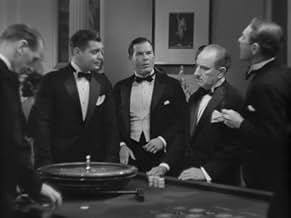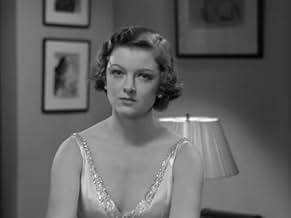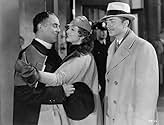CALIFICACIÓN DE IMDb
7.1/10
5.1 k
TU CALIFICACIÓN
La amistad entre dos huérfanos perdura a pesar de que crecen en lados opuestos de la ley y se enamoran de la misma mujer.La amistad entre dos huérfanos perdura a pesar de que crecen en lados opuestos de la ley y se enamoran de la misma mujer.La amistad entre dos huérfanos perdura a pesar de que crecen en lados opuestos de la ley y se enamoran de la misma mujer.
- Dirección
- Guionistas
- Elenco
- Ganó 1 premio Óscar
- 4 premios ganados en total
Thomas E. Jackson
- Richard Snow
- (as Thomas Jackson)
Isabelle Keith
- Miss Adams
- (as Claudelle Kaye)
Oscar Apfel
- Speaker of Assembly
- (sin créditos)
William Arnold
- Blackjack Dealer
- (sin créditos)
William Augustin
- Detective
- (sin créditos)
Opiniones destacadas
Clark Gable and William Powell are boyhood friends who end up on opposite sides of the law in "Manhattan Melodrama," also starring Myrna Loy. Loy is lovely here, as usual, but she doesn't really have much of a role. The film focuses on Gable and Powell. In the first scenes of the film, we see that they are orphaned and taken in by a man who has lost his son in the same fire that killed the boys' friends and family.
When we see them in present day, Gable is running an illegal gambling joint, leaning on people for money they owe, and dating the Loy character. Powell is in politics. After Loy spends some time with Powell, she decides she'd rather be with him, and eventually they marry, and Powell moves from DA to governor. Gable becomes increasingly ruthless, though the two remain devoted friends.
There are some melodramatic sections in the film, particularly the beginning and the courtroom scene which contains a very dramatic speech delivered by Powell. The acting is marvelous. Gable is likable as a slick gangster who takes things in stride. His smile lights up the screen. He really had one of the great screen presences - looks, a great voice, and dripping with charm.
But the really interesting performance is given by Powell. He's not the witty, energetic Thin Man in this, but a very committed and serious, dignified person with a lot on his shoulders. He's totally believable, and he and Gable provide great contrast. Powell's scene at the end of the film is very touching.
Enjoy the great stars and the story, but don't look for laughs.
When we see them in present day, Gable is running an illegal gambling joint, leaning on people for money they owe, and dating the Loy character. Powell is in politics. After Loy spends some time with Powell, she decides she'd rather be with him, and eventually they marry, and Powell moves from DA to governor. Gable becomes increasingly ruthless, though the two remain devoted friends.
There are some melodramatic sections in the film, particularly the beginning and the courtroom scene which contains a very dramatic speech delivered by Powell. The acting is marvelous. Gable is likable as a slick gangster who takes things in stride. His smile lights up the screen. He really had one of the great screen presences - looks, a great voice, and dripping with charm.
But the really interesting performance is given by Powell. He's not the witty, energetic Thin Man in this, but a very committed and serious, dignified person with a lot on his shoulders. He's totally believable, and he and Gable provide great contrast. Powell's scene at the end of the film is very touching.
Enjoy the great stars and the story, but don't look for laughs.
'Manhattan Melodrama' may not have the stylistic finish to it to make it a great message movie about contemporary 30s issues, but it does go a long way towards that end, and is never less than engaging.
Clark Gable is the happy-go-lucky gangster Blackie who is being tried for murder by his boyhood best friend Jim, William Powell, a D.A. who has made it to governor of New York because of a murder done by Blackie, unbeknownst to Jim. On top of it all they both love the same woman, Myrna Loy.
Despite its melodramatic but never overwrought style 'Manhattan Melodrama' has sufficient weight and substance to make itself heard 70 years after the fact. It cuts no convenient corners in the description of the governor's sad plight of having to decide whether his friend should live or die, and it paints a wonderful and believable picture of Loy's character who does what she deems best. Powell delivers a multi-layered performance that has to count amongst his best, and Gable is irrepressible and delightfully amoral as the bad guy we're all rooting for.
Recommended, but please don't judge it by the first 20 minutes which are rather slow-moving, but still entertaining.
Clark Gable is the happy-go-lucky gangster Blackie who is being tried for murder by his boyhood best friend Jim, William Powell, a D.A. who has made it to governor of New York because of a murder done by Blackie, unbeknownst to Jim. On top of it all they both love the same woman, Myrna Loy.
Despite its melodramatic but never overwrought style 'Manhattan Melodrama' has sufficient weight and substance to make itself heard 70 years after the fact. It cuts no convenient corners in the description of the governor's sad plight of having to decide whether his friend should live or die, and it paints a wonderful and believable picture of Loy's character who does what she deems best. Powell delivers a multi-layered performance that has to count amongst his best, and Gable is irrepressible and delightfully amoral as the bad guy we're all rooting for.
Recommended, but please don't judge it by the first 20 minutes which are rather slow-moving, but still entertaining.
Two boyhood friends (one played by a very young Mickey Rooney) grow up on opposite sides of the law. Clark Gable becomes a criminal--William Powell becomes governor. Myrna Loy loves both.
This plot is now screamingly familar but, back in 1934, this was original. In fact it won the Best Original Story Oscar for its year. This could have been a real howler but a great cast, tight script and wonderful direction really put it over. Well worth catching--especially for a powerful climatic scene between Powell and Gable. A classic of its type.
This plot is now screamingly familar but, back in 1934, this was original. In fact it won the Best Original Story Oscar for its year. This could have been a real howler but a great cast, tight script and wonderful direction really put it over. Well worth catching--especially for a powerful climatic scene between Powell and Gable. A classic of its type.
With a cast like this, how can you go wrong? And the film is a delight from beginning to end. Although all the players were great, special kudos to William Powell, whose uncompromising morals cause him to lose almost everything he has. His is a gut-wrenching performance, and the scene in which he addresses the assembly with tears in his eyes to tell of his own "weakness"--wow. It's rare to see Powell in a role with so much complexity and it is a marvelous performance.
... those being "San Francisco" given the impact a disaster has on a community and the friendship as well as adversarial relationship the two male leads have to one another - with Gable being named "Blackie" in that one too, and the other being "The Thin Man" which reunites William Powell, Myrna Loy, and Nat Pendelton in a much better production that fires on all cylinders. Of course, both of these were directed by the director of this film, W. S. Van Dyke. That being said, this film doesn't seem nearly as good as it could have been.
The plot is this - Two friends grow up in the shadow of tragedy caused by sudden loss. The younger one is Blackie Gallagher (Clark Gable) and is always trying to work an angle - usually involving gambling - even before the tragedies. The older one is Jim Wade (William Powell) always studying, always chiding Blackie for his slacker and crooked ways, but always his friend. In adulthood, Blackie is a big time gambler and casino owner and is not adverse to murdering associates and Jim becomes district attorney in New York. And yet whenever they meet they seem fast friends. Eleanor (Myrna Loy) starts out Blackie's girl but decides she wants the conventional marriage she'll never get from Blackie and eventually marries Jim.. At this point I was starting to get bored with this morality tale until some of Blackie' s criminal acts cross paths with Jim's official duties where complications ensue.
There is just something off about this film. For one, Jim is supposed to be an uncorruptible political star destined for higher office but within the details of the film instead seems hopelessly naive and inflexible. Myrna Loy makes the transition from gangster moll to pious first lady in the blink of an eye, and even when she is with Blackie she is nagging him to "quit the rackets". Where did she think those marvelous evening gowns came from? There's just no way I'm believing Blackie is as ruthless in the rest of the film as he is shown to be and is just so "Oh gee whiz what class Jim has!" in response to things that impact his male pride (Eleanor), his livelihood, and even life itself. I guess none of this is as ridiculous as being expected to believe that Mickey Rooney grows up to be Clark Gable, but still the inconsistent characterizations are bothersome.
I'd say it is probably worthwhile overall and just to give it a pass as some of the weirdness may have been caused by confusion over just what exactly the production code, which began to be enforced two months after this was released, would allow.
The plot is this - Two friends grow up in the shadow of tragedy caused by sudden loss. The younger one is Blackie Gallagher (Clark Gable) and is always trying to work an angle - usually involving gambling - even before the tragedies. The older one is Jim Wade (William Powell) always studying, always chiding Blackie for his slacker and crooked ways, but always his friend. In adulthood, Blackie is a big time gambler and casino owner and is not adverse to murdering associates and Jim becomes district attorney in New York. And yet whenever they meet they seem fast friends. Eleanor (Myrna Loy) starts out Blackie's girl but decides she wants the conventional marriage she'll never get from Blackie and eventually marries Jim.. At this point I was starting to get bored with this morality tale until some of Blackie' s criminal acts cross paths with Jim's official duties where complications ensue.
There is just something off about this film. For one, Jim is supposed to be an uncorruptible political star destined for higher office but within the details of the film instead seems hopelessly naive and inflexible. Myrna Loy makes the transition from gangster moll to pious first lady in the blink of an eye, and even when she is with Blackie she is nagging him to "quit the rackets". Where did she think those marvelous evening gowns came from? There's just no way I'm believing Blackie is as ruthless in the rest of the film as he is shown to be and is just so "Oh gee whiz what class Jim has!" in response to things that impact his male pride (Eleanor), his livelihood, and even life itself. I guess none of this is as ridiculous as being expected to believe that Mickey Rooney grows up to be Clark Gable, but still the inconsistent characterizations are bothersome.
I'd say it is probably worthwhile overall and just to give it a pass as some of the weirdness may have been caused by confusion over just what exactly the production code, which began to be enforced two months after this was released, would allow.
¿Sabías que…?
- TriviaThe opening scenes depict the General Slocum disaster on the morning of June 15, 1904. The popular excursion steamer caught fire in New York's East River while transporting passengers to a picnic organized by St. Mark's Evangelical German Lutheran Church on the Lower East Side of Manhattan. With an estimated 1,021 fatalities, mostly women and children, this was New York City's single worst tragedy, in terms of lives lost, before 9/11. An incompetent, inexperienced crew was held primarily to blame for the tragedy.
- ErroresIn the cheering New York City crowds on Jim Wade's election night, supposedly in November 1925, theatre marquees are promoting 1933 films, including MGM's Dinner at Eight (1933) and Polvorilla (1933) with Michael Strogoff (1910).
- Citas
Edward J. 'Blackie' Gallagher: Die the way you lived, all of a sudden, that's the way to go. Don't drag it out.
- Versiones alternativasAlso available in a computer colorized version.
- ConexionesFeatured in David O. Selznick: 'Your New Producer' (1935)
Selecciones populares
Inicia sesión para calificar y agrega a la lista de videos para obtener recomendaciones personalizadas
- How long is Manhattan Melodrama?Con tecnología de Alexa
Detalles
- Fecha de lanzamiento
- País de origen
- Idioma
- También se conoce como
- Manhattan Melodrama
- Locaciones de filmación
- Productoras
- Ver más créditos de la compañía en IMDbPro
Taquilla
- Presupuesto
- USD 355,000 (estimado)
- Tiempo de ejecución1 hora 33 minutos
- Color
- Relación de aspecto
- 1.37 : 1
Contribuir a esta página
Sugiere una edición o agrega el contenido que falta

Principales brechas de datos
By what name was Sendas distintas (1934) officially released in India in English?
Responda





































